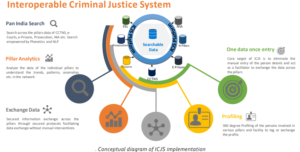In news
Recently Minister of State for Home Affairs addressed the inaugural session of the second conference on ‘Good Practices in Crime and Criminal Tracking Network and Systems (CCTNS) and Interoperable Criminal Justice System (ICJS)
About Crime and Criminal Tracking Network and Systems (CCTNS)
The minister said that out of the total of 16,098 police stations in the country, the CCTNS software is being used in over 95 per cent of police stations and connectivity is available at 97 per cent police stations, and 93 per cent of police stations are entering 100 per cent FIRs through CCTNS.
The CCTNS is accessible to the investigating officers throughout the country.
The Crime and Criminal Tracking Network Systems (CCTNS) was conceptualized by the Ministry of Home Affairs in detailed consultation with all stakeholders and is being implemented as a “Mission Mode Project (MMP)” since 2009.
Crime and Criminal Tracking Network & Systems (CCTNS) is a plan scheme conceived in the light of experience of a non-plan scheme namely – Common Integrated Police Application (CIPA)
CCTNS aims at creating a comprehensive and integrated system for enhancing the efficiency and effective policing at all levels and especially at the Police Station level through adoption of principles of e-Governance, and creation of a nationwide networked infrastructure for evolution of IT-enabled state of- the-art tracking system around “investigation of crime and detection of criminals” in real time, which is a critical requirement in the context of the present day internal security scenario.
Objectives of CCTNS
- Provide Citizen Centric Police Services via a web portal
- Pan India search on National database of Crime & Criminal records
- Crime and Criminal reports at State and Center
- Computerization of Police Processes
About Interoperable Criminal Justice System (ICJS)
Inter-operable Criminal Justice System (ICJS) is an ambitious project aiming to integrate the Crime and Criminals Tracking Network and Systems (CCTNS) project with the e-courts and e-prisons databases, as well as with other pillars of the criminal justice system such as Forensics, Prosecution, and Juvenile homes in a phased manner.

Significance of ICJS
- Quick data transfer among different pillars of criminal justice system, which will not only enhance transparency but also reduce processing time.
- Enable National level crime analytics to be published at increased frequency, which will help the policy makers as well as lawmakers in taking appropriate and timely action.
- Enable pan-India criminal/accused name search in the regional language for improved inter-state tracking of criminal movement.















